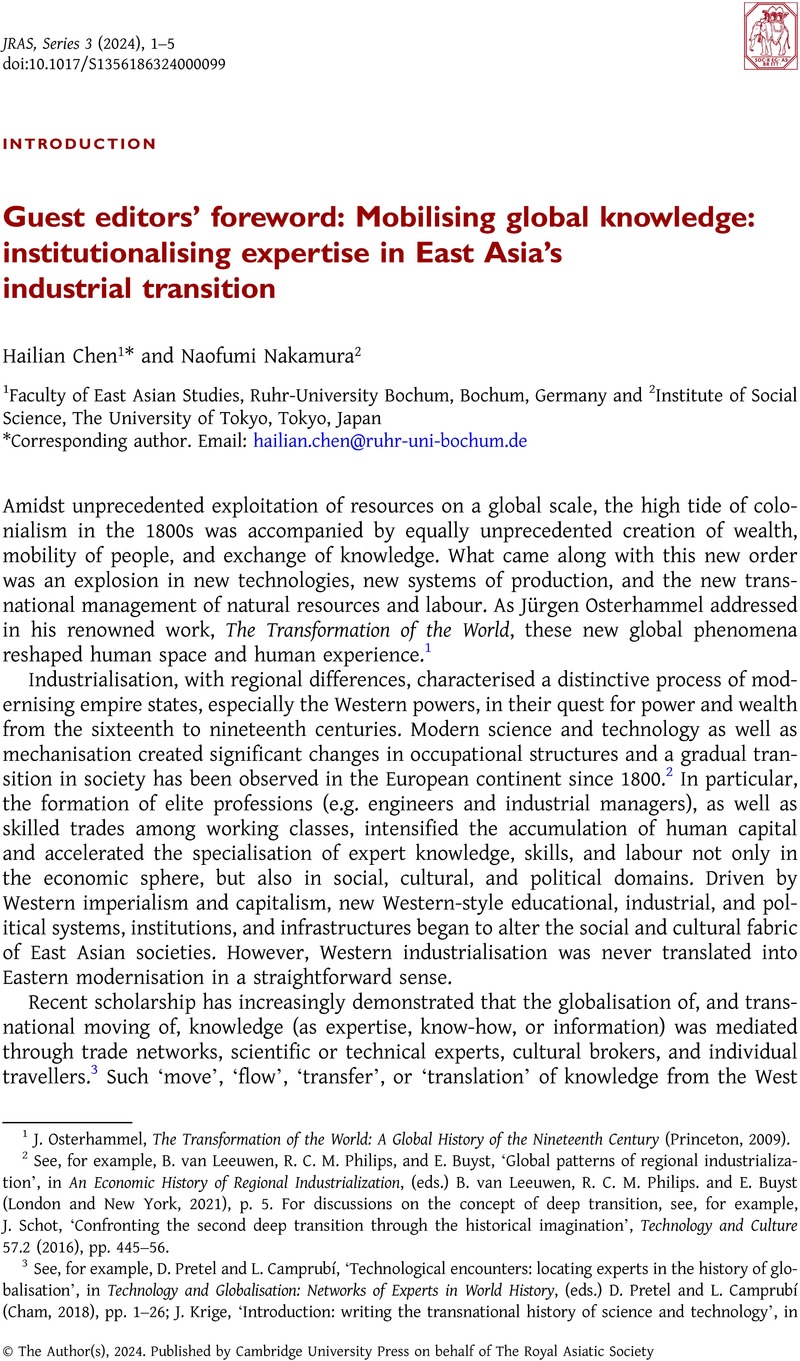No CrossRef data available.
Article contents
Guest editors’ foreword: Mobilising global knowledge: institutionalising expertise in East Asia's industrial transition
Published online by Cambridge University Press: 15 April 2024
Abstract

- Type
- Introduction
- Information
- Copyright
- Copyright © The Author(s), 2024. Published by Cambridge University Press on behalf of The Royal Asiatic Society
References
1 Osterhammel, J., The Transformation of the World: A Global History of the Nineteenth Century (Princeton, 2009)Google Scholar.
2 See, for example, Leeuwen, B. van, Philips, R. C. M., and Buyst, E., ‘Global patterns of regional industrialization’, in An Economic History of Regional Industrialization, (eds.) Leeuwen, B. van, Philips, R. C. M.. and Buyst, E. (London and New York, 2021), p. 5Google Scholar. For discussions on the concept of deep transition, see, for example, Schot, J., ‘Confronting the second deep transition through the historical imagination’, Technology and Culture 57.2 (2016), pp. 445–56CrossRefGoogle ScholarPubMed.
3 See, for example, Pretel, D. and Camprubí, L., ‘Technological encounters: locating experts in the history of globalisation’, in Technology and Globalisation: Networks of Experts in World History, (eds.) D. Pretel and L. Camprubí (Cham, 2018), pp. 1–26CrossRefGoogle Scholar; Krige, J., ‘Introduction: writing the transnational history of science and technology’, in How Knowledge Moves: Writing the Transnational History of Science and Technology, (ed.) Krige, J. (Chicago and London, 2019), pp. 1–31CrossRefGoogle Scholar; Hellyer, R., Green with Milk and Sugar: When Japan Filled America's Tea Cups (New York, 2021)Google Scholar; Krige, J., ‘Introduction: writing the transnational history of knowledge flows in a global age’, in Knowledge Flows in a Global Age: A Transnational Approach, (ed.) Krige, J. (Chicago and London, 2022), pp. 1–30CrossRefGoogle Scholar.
4 See, for example, Headrick, D., The Tools of Empire: Technology and European Imperialism in the Nineteenth Century (Oxford and New York, 1981)Google Scholar; Inkster, I., Science and Technology in History: An Approach to Industrial Development (London, 1991)CrossRefGoogle Scholar; Hård, M. and Jamison, A. (eds.), The Intellectual Appropriation of Technology: Discourses on Modernity, 1900–1939 (Cambridge, MA, 1998)Google Scholar; T. Nakaoka 中岡哲郎, Nihon Kindai Gijutsu no Keisei 日本近代技術の形成 [Formation of Modern Technology in Japan] (Tokyo, 2006). For recent publications on the East Asian contexts, see, for example, Culp, R., U, E., and Yeh, W. (eds.), Knowledge Acts in Modern China: Ideas, Institutions, and Identities (Berkeley, 2016)CrossRefGoogle Scholar; Wong, L. W. (ed.), Translation and Modernization in East Asia in the Nineteenth and Early Twentieth Centuries (Hong Kong, 2017)Google Scholar; Sicilia, D. B. and Wittner, D. G., ‘Introduction: capacious connections with and within East Asia’, in Strands of Modernization: The Circulation of Technology and Business Practices in East Asia, 1850–1920, (eds.) Sicilia, D. B. and Wittner, D. G. (Toronto, Buffalo, and London, 2021), pp. 1–17CrossRefGoogle Scholar; Pauer, E. and Mathias, R. (eds.), Accessing Technical Education in Modern Japan (Amsterdam, 2022)Google Scholar; Tsai, W., ‘China's debut at the universal exhibition in Vienna in 1873 and the forgotten Port and Catalogues’, Journal of National Taiwan Normal University, 67.1 (2022), pp. 1–39Google Scholar; Seow, V., Carbon Technocracy: Energy Regimes in Modern East Asia (Chicago and London, 2022)Google Scholar; Tsai, W., The Making of China's Post Office: Sovereignty, Modernization, and the Connection of a Nation (Cambridge, MA, 2024)Google Scholar.
5 For the history of expertise studies, see, for example, Watson, J. C., A History and Philosophy of Expertise: The Nature and Limits of Authority (London, New York, Oxford, New Delhi, and Sydney, 2022)CrossRefGoogle Scholar.
6 Theoretical discussions of expertise and specialised or professional knowledge are topics that are often examined in the disciplines of sociology of knowledge and philosophy of education, and are beyond the scope of this Special Issue. See, for example, Young, M. and Muller, J. (eds.), Knowledge, Expertise, and the Professions (London and New York, 2014)CrossRefGoogle Scholar.





